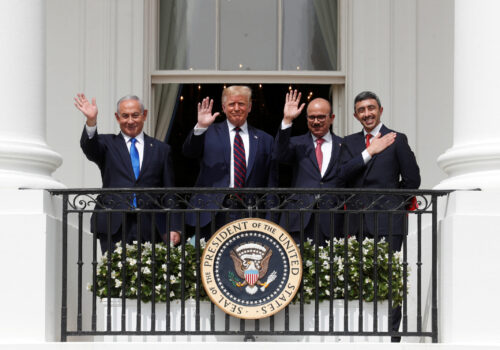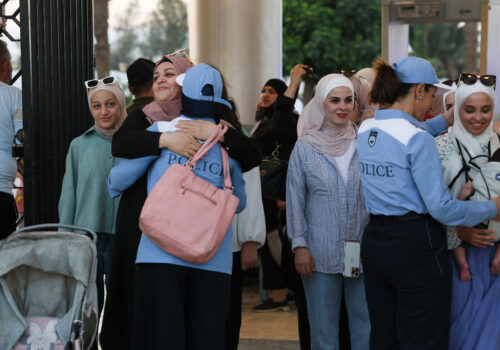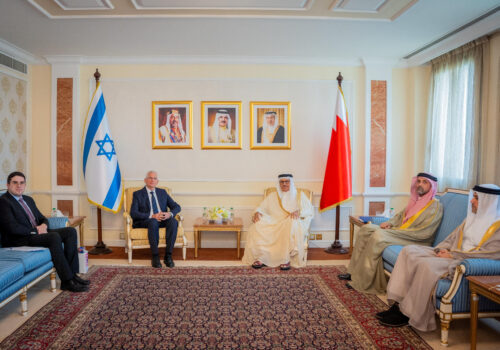Are Arab nations going to impose real costs on Israel?
For nearly two years since the October 7, 2023, Hamas attack, the biggest question facing the Middle East has been: What combination of circumstances, pressures, or concessions can help the region break free from its spiral of violence? This week’s emergency Arab-Islamic summit, called in response to Israel’s unprecedented attack on Hamas leaders in Doha, promised possible answers.
As regional powers gathered in Doha on September 15, there were hopes, if not expectations, that they would coalesce around a tougher line against Israel—and a formula for securing a cease-fire in Gaza. The summit proved to be a missed opportunity, as the participating nations did not call for specific military or economic action, but the gathering did plant a seed for what could come.
Over the past two years, Israeli Prime Minister Benjamin Netanyahu determined that the best path to his definition of national security was to eschew diplomatic negotiations and pursue military means to secure both the nation and his own political future. This required Israel to bomb Hezbollah, Houthi, and Iranian forces in clear self-defense. But it also led lsrael to bomb Syrians and destroy the Gaza Strip. The government of Israel has presided over a policy that led to the deaths of tens of thousands of civilians and cemented steps to prevent a Palestinian state. It has also ensured that the dwindling number of living Israeli hostages remain imprisoned.
Meanwhile, two different US presidents repeatedly dashed hopes that they would impose a permanent cease-fire. After all, the United States has also attacked Iran-backed militias in Iraq and Syria, bombed Iran, and intensified (before halting) assaults on the Houthis in Yemen, while giving Netanyahu free rein in Gaza and the West Bank. US policies are often viewed as part of the problem, even though they could be part of the solution. Don’t forget that US President Donald Trump helped force a Gaza cease-fire as he came into office in January and helped bring the Israel-Iran hostilities to a close in June.
As these devastating conflicts have continued, Hamas has lost the support of the majority of Gazans, faced public calls for its disarmament from a majority of Arab states, and suffered near-extermination by unrelenting Israel Defense Forces (IDF) attacks. After two years of fighting, Hamas has lost virtually all of its military support in the region and has recently made multiple statements indicating that it is ready to make a final deal to end the conflict.
Israel’s military successes have allowed the IDF substantial freedom of maneuver. But over time, international criticism of Israel’s prosecution of the war has ramped up to include a range of boycotts, legal proceedings against Israelis for breaking international laws, and national commitments to recognize a Palestinian state. US support for Israel has reached unprecedented lows, both in Congress and among voters, especially Democrats and independents. Israeli domestic support for a deal to release all the hostages has remained strong, and military leaders have warned of exhaustion and low morale among IDF reservists.
Nonetheless, until Israel’s reckless and widely criticized strike on Doha, this pattern seemed likely to continue with scant regional resistance until Netanyahu decided to declare victory. That strike may have changed the equation.
Endangered, embarrassed, and undermined
Whatever the intended goals, the consequences of the Doha strike largely fall under three categories:
First, the Israeli strike endangered (perhaps ended) the cease-fire negotiations, given that the quickest way to signal your lack of interest in negotiations is to try and kill your negotiating partners. And the cessation of negotiations further endangers the hostages in Gaza, Palestinians living in Gaza, and Israel’s international reputation and standing.
Second, it embarrassed Trump, who said he had not signed off on the strike. It embarrassed the Qatari government, which failed to protect its citizens and guests, and Israel embarrassed its partners in the region, especially the Abraham Accord countries. And the attack’s lack of clear success is an embarrassment to Israel.
Third, it undermined international law. It undermined the United States’ standing as a partner and protector in the Gulf region. And it undermined the diplomatic trust between Israel, Abraham Accords countries, and Israel’s partners in the region.
The vehement and almost universal condemnation of the Doha strike suggested that this could be the event that shifts the trajectory of Israel’s hubris and hegemony in the region.
The United States will not drive this change. Netanyahu’s attack on a valued US non-NATO ally placed Trump firmly in the company of frustrated presidents from his immediate predecessor, President Joe Biden, all the way back to President George H.W. Bush. None rescued the region from its perpetual violence, and the world shouldn’t expect Trump to do so. Secretary of State Marco Rubio’s visit to Israel on the day of the Arab-Islamic summit sent a strong signal of dismissiveness toward the gathering.
Nonetheless, the countries within the region are starting to understand that they have leverage to constrain Israeli violence. The summit’s communiqué made clear that they still hesitate to use it.
For the past two years, Israel saw remarkable support from Arab partners. It could not have defended itself as effectively or conquered its adversaries so thoroughly without quiet assistance from Arab nations. They have been willing to help provide defense against Iran’s missiles, open airspace to Israeli jets, and maintain strong and increasing economic and investment ties throughout the war’s enormous cost in civilian life in Gaza.
Anti-Israel demonstrations occurred in Egypt, Morocco, Bahrain, and other nations that allow such expressions. In the countries that don’t, people have resorted to online statements and other more discreet objections. After the attack on a US ally, Israel’s Arab partners can no longer credibly argue that their positive relationships act as a moderating force. Their unanimous condemnation of the attack on Qatar shows that they understand their vulnerability to lsrael’s definition of defense as well as popular domestic anger.
Rising pressure
Turkey took the first major steps to impose real costs on Israel, including cutting all economic and trade relations and closing airspace to Israeli military aircraft last month. This month, the United Arab Emirates (UAE) warned that Israeli annexation of the West Bank would cross a “red line,” and it barred Israeli firms from the upcoming Dubai Airshow in November. Less than a week after the announcement, the Washington Post reported that the issue of annexation was removed from an Israeli government agenda.
This public assertion of diplomatic strength was unusual for the UAE, but an important reminder to both Israel and the United States of the wisdom of the book of Proverbs: “Pride goeth before destruction, and a haughty spirit before a fall.”
In the face of US inaction, the UAE’s moves suggest that the region may now be willing to deploy more muscular diplomacy, though the UAE’s only action so far in response to the Doha strike was to summon the deputy Israeli ambassador. The possibility of Abraham Accord countries withdrawing economic and, if needed, diplomatic ties may be a powerful motivator for both the Netanyahu and Trump administrations to move more quickly in pursuing peace in the region and getting to “the day after” in Gaza.
Trade numbers between Abraham Accords partners and Israel are robust and growing, but the diplomatic relationships may be worth far more to Israel. It would be a devastating blow for the Israeli psyche to lose the relationships that were to herald a new phase of legitimacy and acceptance for the state of Israel in its own neighborhood. It would also constitute a major political setback for both Netanyahu and Trump, who helped broker the accords in 2020.
Relationships need not be severed for the danger to be recognized and avoided, as Israel’s reaction to the UAE’s “red line” statement proved. Arab leaders merely have to communicate seriousness of purpose.
Netanyahu was no doubt pleased or relieved with the final summit communiqué, and people in the region were unlikely to be satisfied with it. However, while the communiqué’s twenty-five points did not include calls for specific military or economic action, point fifteen urged states to impose sanctions, suspend arm sales, and reconsider diplomatic ties, among other recommendations “to prevent Israel from continuing its actions against the Palestinian people.” The whole document was a clear warning of the direction states would head in if pushed further.
If the carrots of concrete gestures of solidarity with Israel under attack were not enough—if inaction in the face of tens of thousands of fellow Arabs being killed was not enough—then it may be time for the stick of no more business as usual.
Gina Abercrombie-Winstanley is a distinguished fellow at the Scowcroft Middle East Security Initiative of the Atlantic Council’s Middle East Programs and at the Scowcroft Center for Strategy and Security. Abercrombie-Winstanley served as the US ambassador to the Republic of Malta and as special assistant for the Middle East and Africa to the secretary of state. Her Middle East assignments included election monitoring in the Gaza Strip and an assignment in which she supported gender equality in Saudi Arabia as the first woman to lead a diplomatic mission there.
Further reading
Mon, Sep 15, 2025
The Abraham Accords at five
Issue Brief By
On the fifth anniversary of the UAE, Bahrain, and Israel normalizing relations, American, Bahraini, Emirati, Israeli, and Moroccan authors reflect on the transformational change and “warm peace” envisioned by the Abraham Accords—a long-term, generational project.
Wed, Sep 17, 2025
In landmark Syria elections, women still face electoral hurdles
MENASource By Marie Forestier
As the indirect electoral process begins, Syrian officials could take several steps to increase women’s chances in this process.
Thu, Sep 18, 2025
Insights from Israel and the Gulf: An evolving regional integration
MENASource By
At a moment when the Abraham Accords is in question, we witnessed how the region moves quietly, sometimes boldly, towards cooperation.
Image: EMERGENCY ARAB-ISLAMIC-SUMMIT IN DOHA Journalists watch a speech by Qatari Prime Minister and Foreign Minister Sheikh Mohammed bin Abdulrahman bin Jassim Al-Thani on TV during a preparatory ministerial meeting ahead of an emergency Arab-Islamic summit to discuss the Israeli attack on Qatar in Doha, Qatar, September 14, 2025. DOHA Qatar IMAGO/Naushad via Reuters Connect


